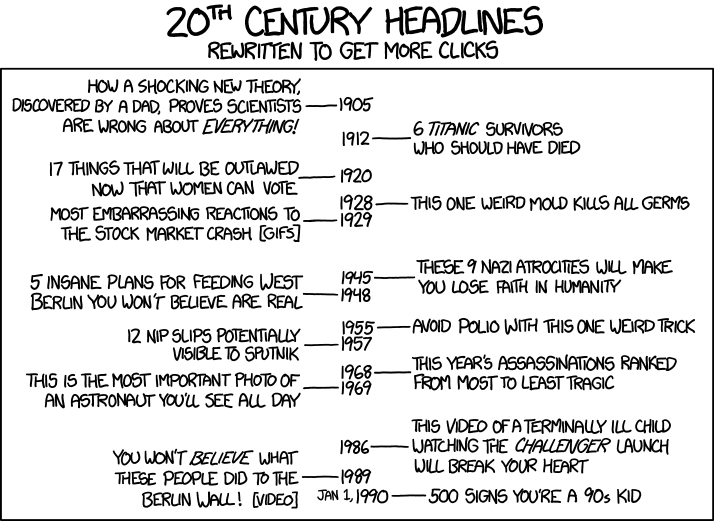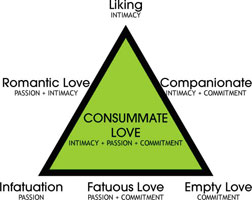You know how it goes:
“University Study Shows Link Between Tooth Size and Memory”
Yes. A correlational link. In male rats learning their way through a maze.
“Are we on the brink of a major cholera outbreak?”
No. Here’s what it would take for a major cholera outbreak to happen. No worries.
“Six Easy Ways to Lose Weight—Without Exercise!”
Well, there are lots of things you can do that aren’t “exercise”—take the stairs instead of the elevator! Oh, and about those donuts …
“If you don’t know this, you could be poisoning yourself with toothpaste!”
Here’s an article about why you shouldn’t use Colgate, courtesy of Crest marketing.
What I’m getting at here is that misleading headlines (a relative of clickbait) suck. On some level, I bet we can all agree with that. If I title an article, oh, say, “Writers here are more prolific—is it time to pack up and move?” and then tell you about how this weekend, a friend came to visit me in Asheville, and we both got an above-average amount of writing done, you’d probably be annoyed.
 That is, if you read the article.
That is, if you read the article.
And that’s the problem. There are so many headlines these days, even just online. Facebook, Twitter, sidebar feeds, home pages, articles shared by friends and family, and whatever else the kids are doing these days. (No joke: I had to ask my students on more than one occasion what a social network or app was, only to be greeted by a swath of startled faces. Not because I’d stumped them—just because I’m 25 and how am I already outdated?)
I’m a curious person by nature, and chances are, if you’re reading this, so are you (or else a blood relative with a sense of obligation). I’m intrigued by more headlines than I have time to read, assuming I want to do anything other than sit at my computer and read all day. Well, assuming I know better than to sit at my computer and read all day. I try not to take headlines as 100% reliable truth nuggets; it’s not that they’re often false, just that they’re … artfully crafted, let’s say. (Misreporting/misinformation is a whole different issue.)
With all the words out there, though, it gets hard to remember what I saw as a headline versus what I actually read. For instance, I recall seeing headlines recently about how schizophrenia has been linked to smoking, creativity, and/or toxoplasmosis (you know, the cat poop thing pregnant women are supposed to avoid). Mental health interests me, so I’m sure I read at least some of them, but can I confidently tell you what sort of links they’re talking about, what sort of analysis found those links, how they’re defining, say, “creativity”? Nope.
Part of this is because I don’t have a great memory. That’s how I got the concept for first fake title, in fact: a headline announcing a link between sex and improved memory. I read on—sex and improved memory are both pretty great—and found that there was in no way the right sort of data to justify a memory-boosting pickup line. (Want to make this a night to remember—even better? I bet I can memorize your phone number with a bit of help? I don’t know. I’m not good at pickup lines.) I’m not, so far as I know, a male rat running a maze.
Anyway, I don’t have a great memory. Would someone with a better memory be able to keep track of the read-vs.-did-not-read distinction? To an extent, maybe, but more often than not, we aren’t paying close enough attention to file something away that specifically. All we can say is, “Oh, I think I read about that …”
We’re smart, you guys. We can fight for the sanctity of the headline. Well, realistically, we probably can’t, not on a large scale, but on a small scale we can. When you share an article, make sure the headline isn’t misleading, and if it is, include a short explanation or quote that will give a more accurate portrayal. When you read a headline that sounds extreme, earth-shattering, or otherwise too good to be true, trust that instinct and either dismiss it or read the article to get the actual story.
Words can be beautiful, evocative, delightful … but they can also be sneaky, sly, and deceptive—or, I should say, the wielders of words can be all those things. The world is interconnected and able to communicate on an unprecedented level, and we better not fuck that up. Great power, great responsibility, all that.
And listen, Asheville has been good to me thus far, and I’ve been able to get some good chunks of writing done. But you know the thing that headline doesn’t mention? Part of that extra writing comes from the fact that I’m no longer a student and am still unemployed. It’s easy to find time to write when your life is 95% free time. Yeah, it’s nice to have cool places to write—I love Dobra Tea, for instance—but more than that, it’s nice to not have homework to do or essays to grade or shifts to show up for. What’s not nice the fact that, in not very long, I’ll be out of saved money, and although I like to dream, it’s pretty unlikely that between now and then, I’ll land a book deal with a huge advance.
(That said, if you know anyone with a spare book deal with a huge advance, let me know.)
